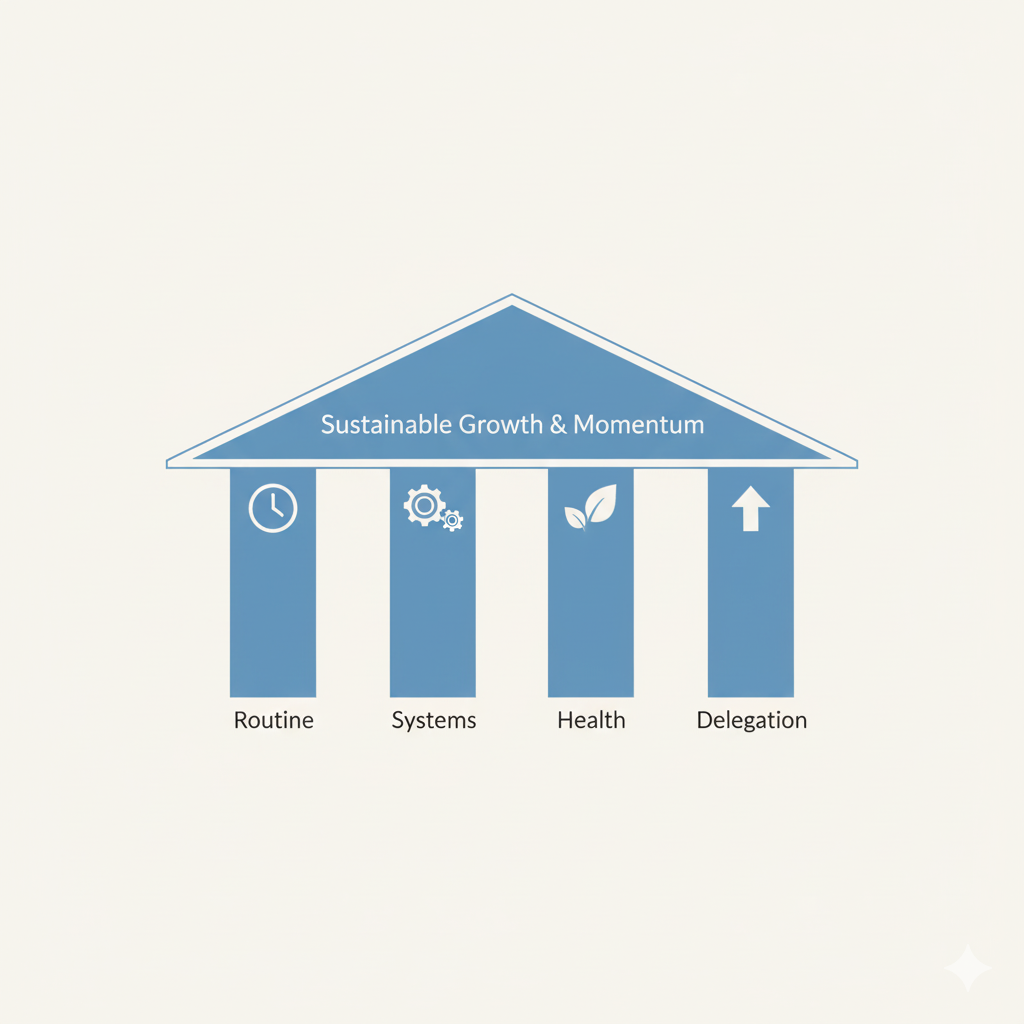Alex Charfen Stress Management: What Entrepreneurs Can Learn in 2025
The glow of a laptop screen cuts through the pre-dawn darkness. It’s 5:30 AM on a Saturday, and for an entrepreneur, the workday has already begun. The infinite scroll of emails, the looming weight of payroll, the constant pressure to innovate in a market that moves at the speed of light—this is the familiar landscape of the modern founder. For so many, stress isn’t just a part of the job; it’s the entire job description. But what if it didn’t have to be?
In the high-stakes world of entrepreneurship in 2025, stress management isn’t a luxury or an optional add-on—it’s a core survival skill. It’s the invisible infrastructure that determines whether a founder thrives under pressure or crumbles beneath it. This is where performance coach and entrepreneur Alex Charfen enters the conversation. With a laser focus on the unique psychology of entrepreneurs, Charfen has built a framework designed not to eliminate stress, but to manage and process it, turning a potential liability into a catalyst for momentum.
This article will unpack the essential principles of the Alex Charfen stress management system. We will explore his core philosophies and translate them into actionable, modern lessons that you, as a founder or leader, can apply to your business and life today.
Who Is Alex Charfen?
To understand Alex Charfen’s methods, you first have to understand who he speaks to. Charfen is an entrepreneur, author, and speaker who has dedicated his career to studying one of the world’s most driven and misunderstood groups: entrepreneurs. He is the creator of the Entrepreneurial Personality Type (EPT) framework, a system that identifies the unique traits, needs, and vulnerabilities of founders and high-achievers.
His advice resonates so deeply with startup leaders because it comes from a place of lived experience. He isn’t a theorist in an ivory tower; he’s a fellow entrepreneur who has built and sold multi-million dollar businesses and experienced the same crushing pressure and isolation that defines the journey. Through his popular podcasts, books like “The Entrepreneurial Personality Type,” and intensive coaching programs, Charfen provides not just strategies, but a language for entrepreneurs to understand themselves.
His credibility comes from this profound understanding that for an entrepreneur, life and business are inextricably linked. He doesn’t offer generic, one-size-fits-all advice. Instead, his entire framework is built to support the specific wiring of a founder’s brain. So, what does Charfen actually teach about managing the intense stress that comes with the territory?
Core Principles of Alex Charfen’s Stress Management Approach
Charfen’s philosophy doesn’t focus on escaping stress but on building a robust operational framework that contains and processes it. He argues that for entrepreneurs, stress is an unavoidable byproduct of growth and pressure. The key is to stop it from becoming noise, chaos, and a drag on performance. This is achieved through four foundational pillars.
“For an entrepreneur, structure doesn’t create confinement; it creates freedom. It’s the rigid systems that allow for explosive creativity and growth.”
1. Routine and Structure
For the entrepreneurial mind, which is constantly exploring new ideas and possibilities, the external world can feel chaotic. Charfen emphasizes that the antidote to this external chaos is internal and external structure. He teaches that a predictable routine is the bedrock of high performance because it drastically reduces decision fatigue. When your foundational actions—waking up, working out, planning your day—are automated, you conserve precious mental energy for the high-stakes decisions that truly matter.
This isn’t about a rigid, joyless schedule. It’s about creating “bookends” for your day. A consistent morning ritual (e.g., hydration, meditation, movement, planning) sets a proactive, intentional tone. A structured evening wind-down (e.g., shutting down screens, reading, journaling) allows the nervous system to shift from “fight-or-flight” to “rest-and-digest,” ensuring restorative sleep.

2. Systems and Processes
Chaos is a primary driver of entrepreneurial stress. Missed deadlines, forgotten tasks, and team misalignment all create a constant, low-grade hum of anxiety. Charfen’s solution is an obsessive focus on systematization. He advocates for turning every repeatable business function into a Standard Operating Procedure (SOP), checklist, or automated workflow.
Why does this work? Systems move operational responsibility from your brain onto a documented process. You no longer have to mentally juggle the 20 steps it takes to onboard a new client; you just follow the checklist. This frees up an immense amount of cognitive bandwidth. For entrepreneurs, who are often the primary bottleneck in their own organizations, systematizing is the only scalable way to reduce personal overload and ensure the business can run without their constant, hands-on intervention.
3. Health as a Foundational Prerequisite
Charfen is uncompromising on this point: your health is the foundation of your capacity to handle pressure. He reframes health not as a personal goal, but as a core business asset. The three non-negotiables are sleep, hydration, and nutrition.
- Sleep: He emphasizes that sleep is not a luxury; it’s a neurological and physiological necessity for memory consolidation, emotional regulation, and problem-solving. A sleep-deprived founder is operating with a severe cognitive handicap.
- Hydration: Proper hydration is directly linked to brain function and energy levels. He often points out that feelings of fatigue and anxiety can often be traced back to simple dehydration.
- Nutrition: Fueling your body with clean, whole foods stabilizes energy and mood, preventing the blood sugar crashes that can exacerbate feelings of stress and irritability.
From a scientific standpoint, prioritizing these pillars is proven to lower baseline cortisol levels, improve focus, and increase emotional resilience, making you better equipped to handle the inevitable challenges of business.
4. Delegation and Team Alignment
The “do-it-all” founder is the one who burns out the fastest. A core tenet of Charfen’s stress management is recognizing that you, the entrepreneur, are the most valuable and expensive resource in your company. Your time should be spent only on the tasks that you uniquely can do. Everything else must be delegated.
However, effective delegation isn’t just about offloading tasks; it’s about creating a team that is deeply aligned with the company’s goals and vision. When every team member understands the mission and knows their specific role in achieving it, the founder is no longer the single point of failure. This alignment creates a powerful, stress-reducing buffer, distributing pressure across the entire organization and freeing the entrepreneur to focus on high-level strategy and growth.
Practical Stress Management Lessons for Entrepreneurs in 2025
So, how can you translate Charfen’s principles into actionable habits? Here are four modern lessons for implementing his system in your daily entrepreneurial life.
3 Things Alex Charfen Wants Every Entrepreneur to Do Daily
- Prioritize 7–8 Hours of Sleep: Treat it as your most important strategic meeting of the day.
- Journal Your Intentions: Spend 5 minutes each morning clarifying your single most important priority.
- Hydrate Aggressively: Start your day with a large glass of water with electrolytes and continue throughout the day.
1. Systematize Your Personal and Professional Workflows
Take a practical inventory of your week. What tasks do you repeat constantly? It could be posting on social media, responding to client inquiries, or even planning your meals. Choose one of these areas and systematize it this week.
Example: For project management, create a simple board in a tool like Trello, Asana, or ClickUp. Create columns for “To Do,” “In Progress,” and “Done.” Create a template or checklist for each new project or client. This simple act moves the entire workflow out of your head and into a reliable system, instantly reducing the mental load and stress of trying to remember every detail.
2. Reframe Self-Care as a Business Strategy
Stop thinking of health and wellness activities as things you do if you have time. Start scheduling them as non-negotiable appointments in your calendar. They are investments in your company’s most critical asset: you.
- Practical Routine 1: The “Shutdown” Ritual. At the end of your workday, take 10 minutes to plan the next day’s top 1-3 priorities. Then, close your laptop and physically walk away. This creates a clear boundary between work and personal time, preventing chronic stress.
- Practical Routine 2: Movement as a Meeting. Schedule a 20-minute walk or workout in the middle of your day. This isn’t skipping work; it’s a strategic meeting with your body and mind, proven to boost creativity and reduce stress for the rest of the day.
3. Implement Daily Alignment Rituals
Clarity is the enemy of stress. A few minutes spent clarifying intentions can save hours of anxious, unfocused work.
- Personal Alignment (10 minutes): Start your day with a simple journaling practice. Don’t just write a to-do list. Answer three questions: What am I grateful for? What is my single most important outcome for today? What potential challenges might arise and how will I handle them?
- Team Alignment (15 minutes): If you have a team, start each day with a quick “daily huddle” or sync. Each person briefly states their priority for the day and any roadblocks. This simple ritual eliminates ambiguity, prevents miscommunication, and ensures everyone is rowing in the same direction, which dramatically reduces collective stress.
4. Build a Culture of Psychological Safety
As a leader, one of the most powerful stress-reduction tools you have is the culture you create. A supportive team environment where people feel safe to be vulnerable is a massive competitive advantage.
- Implement “Stress Check-ins”: Start your team meetings with a quick 1-5 rating from each person on their current stress level. This normalizes the conversation around mental health and gives you a real-time pulse on your team’s well-being.
- Encourage “Mental Health Days”: Frame taking a day off for mental rest not as a weakness, but as a strategic necessity for long-term performance.
- Practice Open Communication: As a leader, openly sharing your own challenges (appropriately) gives your team permission to do the same, fostering a culture where asking for help is a sign of strength, not a liability.
Comparing Charfen’s Approach with Other Stress Management Methods
Traditional stress management often focuses on activities that are separate from work—like yoga, meditation, therapy, or hobbies. While these are incredibly valuable and necessary, Charfen’s approach is fundamentally different. He embeds stress management directly into the operating system of the business and the entrepreneur’s life.
Where general advice might say “take a break to meditate,” Charfen’s advice is to “build a system so you don’t feel the need to escape your business in the first place.” His method is less about “wellness on the side” and more about creating a business-embedded framework for resilience. This entrepreneur-first framing is what makes his ideas especially valuable in 2025, as the lines between work and life become increasingly blurred.
Why Charfen’s Ideas Matter Even More in 2025
The timeless principles of routine and systems have become even more critical in the face of today’s unique challenges.
- The Rise of Remote/Hybrid Work: With teams distributed, clear systems, processes, and daily alignment rituals are no longer a “nice-to-have”; they are the only way to maintain cohesion and prevent the chaos and stress of miscommunication.
- AI Disruption and Market Speed: The rapid advancements in AI are accelerating the pace of every industry. Entrepreneurs who are bogged down by administrative chaos and decision fatigue will be left behind. A systematized business allows a leader to stay agile, strategic, and focused on adapting to new technologies.
- Economic Instability: In uncertain economic times, resilience is key. A founder’s personal well-being—their sleep, health, and mindset—is directly tied to their ability to lead their team through challenges with a clear and steady hand. Charfen’s principles are a blueprint for building that personal and organizational fortitude.
Conclusion: Building Your Own Stress-Resilient Entrepreneurial Journey
The entrepreneurial journey will always involve pressure. The Alex Charfen stress management philosophy doesn’t promise a stress-free life, but it offers a powerful alternative: a life where stress is understood, contained, and processed effectively. The core takeaways are a masterclass in proactive resilience: build routines to protect your energy, create systems to reduce chaos, prioritize your health as your greatest asset, and align your team to share the load.
You don’t need to implement everything at once. This week, choose just one of these principles to experiment with. Maybe it’s defining a 15-minute morning ritual, documenting one repeatable task, or scheduling a non-negotiable workout. These small, structured steps are the building blocks of momentum.
With the right framework, stress doesn’t have to be a liability that leads to burnout—it can be managed into a signal that you are growing, pushing boundaries, and building something that matters.
To explore more actionable techniques for managing daily stress, check out our articles in the Practical Stress Relief Techniques category on BeMyHealer.com.






